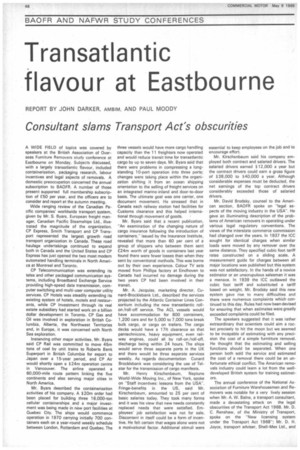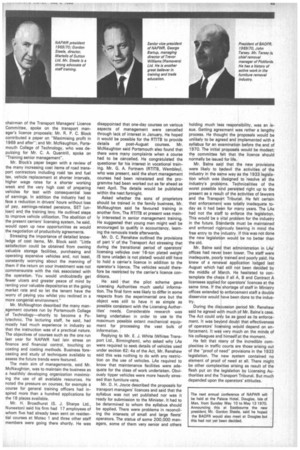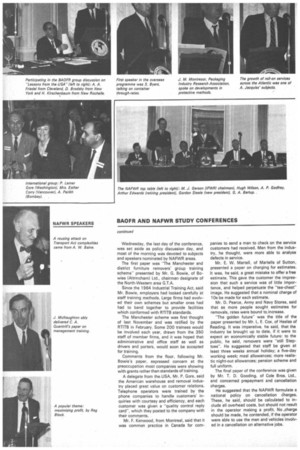Transatlantic flavour at Eastbourne
Page 50

Page 51

Page 52

If you've noticed an error in this article please click here to report it so we can fix it.
REPORT BY JOHN DARKER, AMBIM, AND PAUL MOODY
Consultant slams Transport Act's obscurities
A WIDE FIELD of topics was covered by speakers at the British Association of Overseas Furniture Removers study conference at Eastbourne on Monday. Subjects discussed, with a largely transatlantic flavour, included containerization, packaging research, labour incentives and legal aspects of removals. A domestic preoccupation concerned the annual subscription to BAOFR. A number of those present supported full membership subscription of FO per year, and the officers are to consider and report at the autumn meeting.
Wide ranging review of the Canadian Pacific companies' worldwide transport system, given by Mr. S. Byars. European freight man ager, Canadian Pacific Steamships Ltd., illustrated the magnitude of the organization.
CP Express, Smith Transport and CP Trans port represented the largest growth road transport organization in Canada. These road haulage undertakings continued to expand both in Canada and the United States and CP Express has just opened the two most modern automated handling terminals in North America at Montreal and Toronto.
CP Telecommunication was extending its telex and other packaged communication sys tems, including Broadband Exchange Service providing high-speed data transmission, computer switching and multi-user computer utility services. CP Hotels was steadily extending its existing system of hotels, motels and restaurants, while CP Investment through its real estate subsidiary had started work on a billion dollar development in Toronto. CP Gas and Oil was involved in exploration in British Co lumbia, Alberta, the Northwest Territories and, in Europe, it was concerned with North Sea exploration.
Instancing other major activities, Mr. Byars said CP Rail was committed to move 45m tons of coal by unit trains to Roberts Bank Superport in British Columbia for export to Japan over a 15-year period, and CP Air would shortly open a 524m operation centre in Vancouver. The airline operated a 60.000-mile route pattern linking the five continents and also serving major cities in North America. three vessels would have more cargo handling capacity than the 11 freighters now operated and would reduce transit time for transatlantic cargo by up to seven days. Mr. Byars said that there were problems in compressing a longstanding 10-port operation into three ports; changes were taking place within the organization shifting it from an ocean shipping orientation to the selling of freight services on an integrated marine-inland and door-to-door basis. The ultimate goal was one carrier, one document movement. He stressed that in Canada each railway station had facilities for Customs clearance and this helped international through movement of goods.
Mr. Byars said that a recent publication, "An examination of the changing nature of cargo insurance following the introduction of containers," issued by the Insurance Institute, revealed that more than 60 per cent of a group of shippers who between them sent £24m worth of goods in containers last year found there were fewer losses than when they sent by conventional methods. This was borne out by their own experience. Colour TV sets moved from Phillips factory at Eindhoven to Canada had incurred no damage during the two years CP had been involved in their transit.
Mr. A. Jacquiss, marketing director, Cunard-Brocklebank Ltd., described the services projected by the Atlantic Container Lines Consortium including the new transatlantic rollon /roll-off service. The ACL vessels would have accommodation for BOO containers, 1,200 cars and for 5,000 to 7,000 tons break bulk cargo, or cargo on trailers. The cargo decks would have a 17ft clearance so that pantechnicons, heavy equipment, even railway engines, could all by roll-on /roll-off, discharge being within 24 hours. The ships would serve three separate ports in the UK and there would be three separate services weekly. As regards documentation Cunard Brocklebank was considering the use of Telstar for the transmission of cargo manifests.
Mr. Henry Kirschenbaum, Neptune World-Wide Moving Inc., of New York, spoke on "Staff incentives: lessons from the USA". Fringe-benefits in the US, said Mr. Kirschenbaum, amounted to 25 per cent of basic salaries today. They took many forms and it was his view that new needs constantly replaced needs that were satisfied. Employees' job satisfaction was not for sale. Discontent in itself could be a form of incentive. He felt certain that wages alone were not a motivational factor. Additional stimuli were essential to keep employees on the job and to encourage effort.
Mr. Kirschenbaum said his company employed both contract and salaried drivers. The salaried drivers earned $ 12,000 a year but the contract drivers could earn a gross figure of $38,000 to S40,000 a year. Although considerable expenses must be deducted, the net earnings of the top contract drivers considerably exceeded those of salaried drivers.
Mr. David Brodsky, counsel to the American section, BAOFR spoke on "legal aspects of the moving industry in the USA". He gave an illuminating description of the problems of American removers in operating under various legal regulatory conventions. The views of the interstate commerce commission had changed over the years. In 1937 the ICC sought for identical charges when similar loads were moved by any remover over the same distance. They specified cubic foot tariff rates constructed on a sliding scale. A measurement guide for charges between all major locations was published but this system was not satisfactory. in the hands of a novice estimator or an unscrupulous salesman it was a menace. In 1939 the ICC outlawed the cubic foot tariff and substituted a tariff based on weight. Mr. Brodsky said this new system gave rise to many difficulties and there were numerous complaints which continued to this day. Rules had now been devised for ensuring that when estimates were greatly exceeded complaints could be filed.
The speakers suggested that it was rather extraordinary that scientists could aim a rocket precisely to hit the moon but we seemed to be incapable of estimating with any precision the cost of a simple furntiture removal. He thought that the estimating and selling functions should be separated. When one person both sold the service and estimated the cost of a removal there could be an unfortunate ethical conflict. The American removals industry could learn a lot from the welldeveloped British system for training estimators.
The annual conference of the National Association of Furniture Warehousemen .and Removers was notable for a very lively session when Mr. A. W. Balne, a transport consultant, made a devastating attack on the legal obscurities of the Transport Act 1968. Mr. D. C. Renshaw, of the Ministry of Transport, spoke on the "New licensing system under the Transport Act 1968"; Mr. D. H. Joyce, transport adviser, Shell-Mex Ltd., and chairman of the Transport Managers' Licence Committee, spoke on the transport manager's licence proposals; Mr. R. P. C. Block contributed a paper on "Maximising profit in 1969 and after": and Mr. McNaughton, Portsmouth College of Technology, who was deputizing for Mr. C. A. Quantrill, spoke on "Training senior management".
Mr. Block's paper began with a review of the many increasing cost items of road transport contractors including road tax and fuel tax, vehicle replacement at shorter intervals, higher wage rates for a shorter working week and the very high cost of preparing vehicles for test with consequential loss of earnings. In addition the industry had to face a reduction in drivers' hours without loss of pay, earnings-related pensions, SET (unloan) and the training levy. He outlined steps to improve vehicle utilization, The abolition of the present carriers' licensing system, he said, would open up new opportunities as would the negotiation of productivity agreements.
Stressing the importance of detailed knowledge of cost items, Mr. Block said: "Little satisfaction could be obtained from owning valuable storage facilities, purchasing and operating expensive vehicles and, not least, constantly worrying about the manning of them if the return on your investment was not commensurate with the risk associated with the operation. You would undoubtedly get fewer ulcers and greater peace of mind by renting your valuable depositories at the going market rate and so let the tenant have the worry of paying you whilst you reclined in a more congenial environment."
Mr. McNaughton described the many management courses run by Portsmouth College of Technology—shortly to become a Polytechnic. The lecturing staff, he said, had mostly had much experience in industry so that the instruction was of a practical nature. The objectives of courses such as the one run last year for NAFVVR had lain stress on finance and financial control, touching on costing and costing methods. Business forecasting and study of techniques available to assess the future trends were featured.
The main aim of managements, said Mr.
McNaughton, was to maintain the business as a -healthily. developing organization maximiz
ing the use of all available resources. He noted the pressure on courses, for example a course for general training officers had inspired more than a hundred applications for the 18 places available.
Mr. H. Broadhurst IS. J. Sharpe Ltd., Nuneaton) said his firm had 17 employees of whom five had already been sent on residential courses at Motec 1 and three other staff members were going there shortly. He was disappointed that one-day courses on various aspects of management were cancelled through lack of interest in January. He hoped it would be possible for the RTITB to provide details of post-August courses. Mr. McNaughton said Portsmouth also found that there were many complaints when a course had to be cancelled. He congratulated the questioner for his interest in vocational training. Mr. G. A. Fortnam (RTITB, Wembley), who was present, said the short management courses had been reinstated and the programme had been worked out as far ahead as next April. The details would be published within the next fortnight.
Asked whether the sons of proprietors should be trained in the family business, Mr. McNaughton said he favoured training in another firm. The RTITB at present was mainly interested in senior management training. He suggested that young men might well be encouraged to qualify in accountancy, learning the removals trade afterwards.
Mr. D. C. Renshaw outlined the provisions of part V of the Transport Act stressing that during the transitional period of operators' licensing vehicles over 16-ton plated weight (5 tons unladen is not plated) would still have to hold a carrier's licence in addition to the operator's licence. The vehicles would therefore be restricted by the carrier's licence conditions.
He said that the pilot scheme gave Licensing Authorities much useful information. The final form was likely to differ in some respects from the experimental one but the object was still to have it as simple as possible consistent with the Licensing Authorities' needs. Considerable research was being undertaken in order to use to the maximum possible extent mechanical equipment for processing the vast bulk of information.
Replying to Mr. E. J. White (Whites Transport Ltd., Birmingham), who asked why LAs were required to seek details of vehicles used under section 62: 4a of the Act, Mr. Renshaw said this was nothing to do with any restriction on the use of vehicles. LAs required to know that maintenance facilities were adequate for the class of work undertaken. Obviously tipper vehicles were more heavily stressed than furniture vans.
Mr. D. H. Joyce described the proposals for transport managers' licences and said that the syllabus was not yet published nor was it -ready for submission to the Minister. It had to be determined to whom the syllabus should be applied. There were problems in reconciling the interests of small and large fleets' operators. The status of some 200,000 managers, some of them very senior and others
holding much less responsibility, was an issue. Getting agreement was rather a lengthy process. He thought the proposals would be unlikely to be agreed and implemented with a syllabus for an examination before the end of 1970. The initial proposals would be modest: the committee felt that the licence should normally be issued for life.
Mr. Balne said that the new provisions were likely to bedevil the activities of the industry in the same way as the 1933 legislation which was .designed to 'resolve all the industry's problems. Technicalities of the worst possible kind persisted right up to the present as a result of the activities of lawyers and the Transport Tribunal. He felt certain that enforcement was totally inadequate today as it had been for many years. The LAs had not the staff to enforce the legislation. This would be a vital problem for the industry in the future. Standards must be maintained and enforced rigorously bearing in mind the free entry to the Industry. If this was not done the new legislatibn would be no better than the old.
Mr. Balne said that administration in LAs' offices had neved been lower. The staff were inadequate, poorly trained and poorly paid. He knew of a renewal application lodged last August which had still not been decided by the middle of March. He hesitated to contemplate the chaos if all A, B and Contract A licensees applied for operators' licences at the f
same time. If the, shortage of staff in Ministry
offices extended o enforcement staff a double disservice would pave been done to the indus try.
During the dis ussion period Mr. Renshaw said he agreed w th much of Mr. Balne's case. The Act could only be as good as its enforcement. It was beyond doubt that effectiveness of ' operators' licensing would depend on enforcement. It was very much on the minds of his colleagues and himself at the moment.
He felt that many of the incredible complexities in traffic courts are those arising out of the "proof of need" provisions in the 1933 legislation. The new system contained no element of proof of need at all. There might be other complexities arising as result of the flesh put on the legislation by Licensing Authorities and the Transport Tribunal. But much depended upon the operators' attitudes. Wednesday, the last day of the conference, was set aside as policy discussion day, and most of the morning was devoted to subjects and speakers nominated by NAFWR areas.
The first paper was ''The Manchester and district furniture removers' group training scheme" presented by Mr. G. Bowie, of Bowies (Altrincharn) Ltd., chairman designate of the North-Western area G.T.A.
Since the 1964 Industrial Training Act, said Mr. Bowie, employers had looked carefully at
staff training methods. Large firms had evolved their own schemes but smaller ones had had to band together to provide facilities which conformed with RTITB standards.
The Manchester scheme was first thought of last November and was ratified by the RTITB in February. Some 200 trainees would be involved each year, drawn from the 350 staff of member firms, and it was hoped that administrative and office staff as well as drivers and porters, would soon be accepted for training.
Comments from the floor, following Mr. Bowie's paper, expressed concern at the preoccupation most companies were showing with grants rather than standards of training.
A delegate from the.USA, Mr. P. Gore, said the American warehouse and removal indus try placed great value on customer relations.
Telephone operators were trained by the phone companies to handle customers' in quiries with courtesy and efficiency, and each customer was given a "quality control reply card", which they posted to the company with their comments.
Mr. F. Kenwood, from Montreal, said that it was common practice in Canada for corn
parties to send a man to check on the service customers had received. Men from the industry, he thought, were more able to analyse defects in service.
Mr. E. W. Martell, of Martens of Sutton, presented a paper on charging for estimates. It was, he said, a great mistake to offer a free estimate. This gave the customer the impression that such a service was of little importance, and helped perpetuate the "tea-chest" image. He suggested that a nominal charge of lOs be made for each estimate.
Mr. D. Pearce, Army and Navy Stores, said that as more people sought estimates for removals, rates were bound to increase.
"The golden future" was the title of the paper presented by Mr. L. E. Cox, of Heelas of Reading. It was imperative, he said, that the industry be brought up to date, if it were to expect an economically stable future: to the public, he said, removers were "still Steptoes". He suggested that staff be given at least three weeks annual holiday; a five-day working week: meal allowances; more realistic night-out allowances; pension scheme and full uniform.
The final paper of the conference was given by Mr. T. D. Gooding, of Cole Bros. Ltd., and concerned prepayment and cancellation charges.
He suggested that the NAFWR formulate a national policy on cancellation dharges. These, he said, should be calculated to include all overhead costs, but should not result in the operator making a profit, No .charge should be made, he contended, if the operator were able to use the men and vehicles involved in a cancellation on alternative jobs.


















































































































